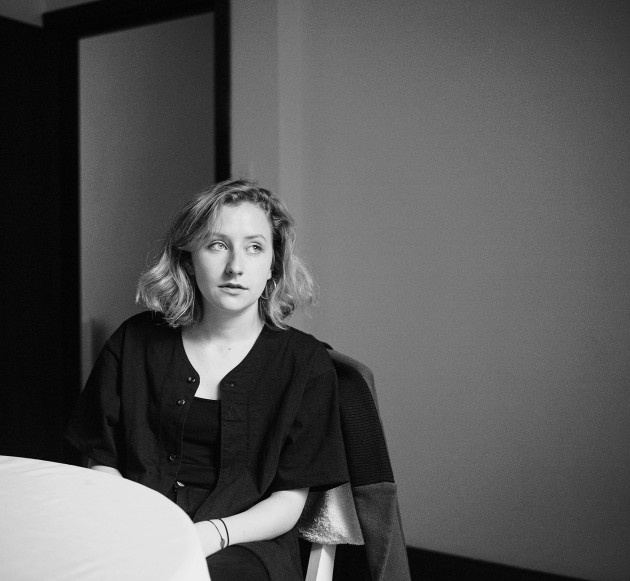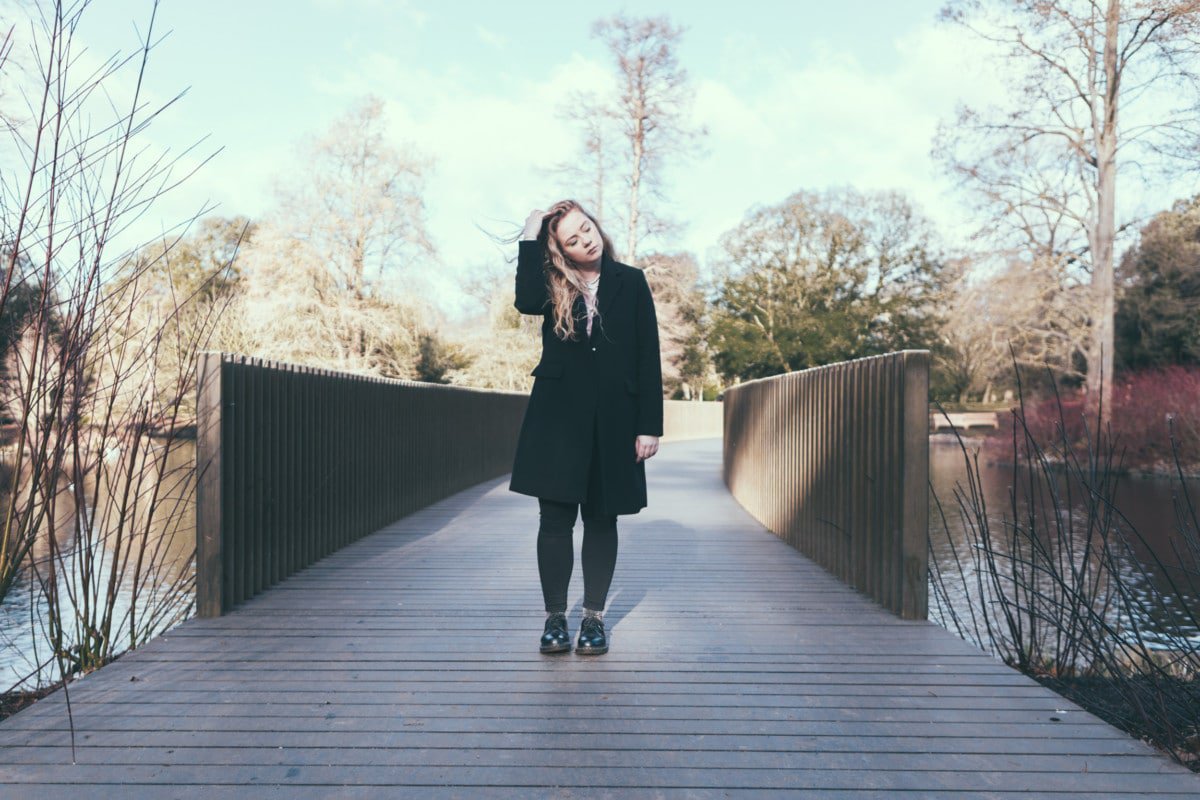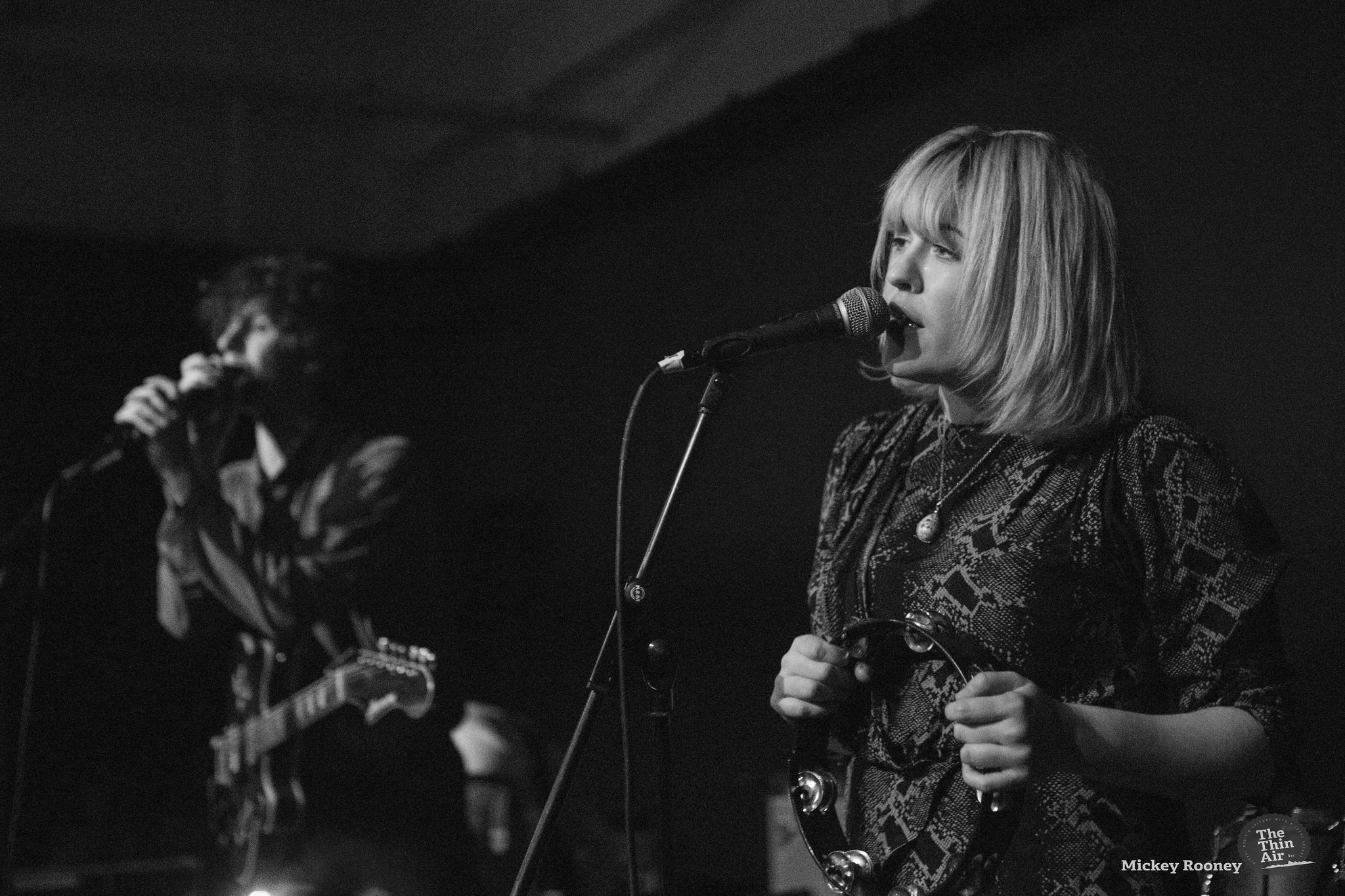Content note: Suicide & self harm.
Under the Fears moniker, Constance Keane hasn’t ever shied from making music that challenges pervasive feelings of anxiety, just as her previous outlet, the sonically-opposing M(h)aol, used primal, abrasive noise-punk as its own vehicle to address greater issues. And, as with anyone who holds complete autonomy over their creativity, it’s often assumed that it’s just one aspect of someone in tune with themselves. By her own admission, Constance has worked hard to accept, utilise, and channel that into a busy and fulfilling professional & artistic life.
However, following a traumatic event in Autumn 2017, Constance fell into a suicidal state, and following several trips to A&E, she was admitted to a psychiatric hospital; in her own words: “I believed I was a plague that the world needed to be rid of”. Thankfully, through her own strength and that of loved ones – not to mention the individuals in the healthcare profession – Constance managed to make a recovery and was released six weeks later. During her stay, she found refuge in the facility’s music room.
While it was initially a place for solitude and reflection, she gradually started using the room’s instruments and eventually, unintentionally, wrote & recorded her next single, ‘h_always’ during her stay. Staying true to the Fears maxim, its essence lies in its disarmingly raw minimalism and a lack of need to build towards an inevitable climax. Its visual companion is a pitch-perfect unison of brain-cleansing, organic imagery which ultimately transforms a stark message into one of reflective, hopeful yearning.
Stevie Lennox had a conversation with Constance about what she dealt with, dispelling the unnecessary stigma attached to the term ‘psychiatric hospital’, and, most importantly, how the creative resources in the facility helped her regain her sense of self, as they can do with anyone.
Throughout your musical output, you’ve dealt with a range of social & internal issues – has music always primarily been a therapeutic, restorative source for you to draw from?
For me, sometimes the music I’m making can actually give a more accurate indication of where I’m at mentally than my conscious brain can. It’s funny, I listen back to some songs I wrote over the summer last year and I can hear a lot more about what was going on internally than I even realised at the time. Not just with the lyrics, either. Some of the instrumentation and production sounds like what I feel more than I’d be able to say how I feel. I’ve always felt really grateful to have music as an outlet, and even more so now after having a breakdown, because at least I had that to fall back on.
As mentioned, you’ve been forthcoming about the subject matter confronted in your music. For someone who seems in control and emotionally aware of themselves, could you perhaps share how you – or anyone – could be suddenly become more susceptible to finding themselves in a similar headspace, and if there’s any advice you could give?
Unfortunately, the thing about life is that we have no idea what’s going to happen to us or those around us. The main reason I’m speaking openly about being an inpatient in a psychiatric hospital is because I never saw myself being one. I was lying in bed on a ward, staring at the folded blue curtain around me, thinking “what has happened to me?”. Sometimes bad things happen in life, and we don’t know how our brain is going to respond. I’ve had anxiety since I was 16, but I had never been suicidal before this experience, and to be honest, I never thought about the fact that I might become suicidal in the future.
My biggest piece of advice is to find a therapist who suits you and who knows you when you’re somewhat “normal”, as in pre-full-breakdown. That means you have a mental health professional who knows how far you might be from your “normal” state, and they know what they’re working towards with your recovery. Therapy is stupidly hard to access through the NHS in my opinion, the waiting lists are awful. I think society needs to take a hard look at the set-up and make huge changes. I was very lucky to have a therapist who helped me a lot with my anxiety in the past, and I could feel safe going back to her in this more extreme situation.
Like the song, the visual accompaniment for ‘h_always’ is minimal, and richly woven with organic imagery. It’s a brain-cleansing sense of appreciation for the senses, and what it is to be alive. Despite its circumstances, it feels as though it encapsulates a yearning for a place of true content. What does that song mean to you?
The video was made by artist Clodagh Farrelly and filmmaker Hugh Mulhern and I am obsessed with it. I actually emailed Hugh the song from hospital, to see if it sparked anything for him. He brought Clodagh on board and they made something that is exactly what I wanted without me even knowing it was what I wanted. I can’t thank them enough.
The song is about broken promises. However, for me, the song is now less about what the song is actually about, if that makes sense. I kept saying “it’s really depressing” to Hugh, and he’d say “no actually I think it’s really hopeful because you can make something so beautiful when you’re in such a bad situation”.
‘h_always’ was written and recorded in the music room of the facility. How were the medical workers in terms of accommodating your wanting to make music, and what was available to assist in your hospital?
My hospital (thankfully) had a music room on site. It was a room with some instruments in it; a drum kit, some keyboards, some guitars, and a bass. That music room was absolutely vital for my recovery. I’m also publicly talking about this experience because when funding cuts take place, it’s often these creative resources in hospitals that get cut. My consultant in hospital told me to write it on a comment card upon my discharge, to make sure the people high up in the hospital knew how much it was helping people. I think it’s really important to talk about how much those resources help people.
The music room was somewhere I could go to and feel a bit more like me. Sometimes I just went to lie on the floor and stare at the ceiling. Other times I would go with my friend from my ward and play loud punk music for half an hour. h_always was written in less than an hour, and I recorded it on my laptop with just the laptop mic. I didn’t really think I’d do anything with it at the time, I had other things on my mind. When I told my therapist about it, she thought it was great and said my homework for the following week was to write an angry song.
You mentioned the fact that your rediscovering music was happening parallel to your recovery (or vice versa) – has your relationship or how you’re approaching music changed since your experience?
My approach to music hasn’t actually changed very much since the experience. At the core of it, it’s me, my laptop, a mic, and a guitar. I think being that self-sufficient brings a certain comfort for someone who uses music as a therapeutic release. It means you’re not relying on other people and you can create something at midnight if you want to.
On that idea of the music itself being a summation of how you felt at a time – was the spontaneity of ‘h_always’ very much just finally, once again, just letting your instinct take over in that moment, shedding that self-consciousness and giving yourself to the creative impulse?
h_always just happened. I stared with the guitar, and within an hour it was all done, recording and everything. As I said, when I was in that music room, I wasn’t usually actively trying to write music. There was zero pressure to create anything there that I’d be bringing outside of that context, and I think that meant my brain was able to bring whatever was brewing subconsciously to the forefront, without me worrying or being self-conscious. I actually think the hospital environment was good for getting rid of self-conscious concerns. No one has to be “good” at anything there. You’re just there. There’s no “normal” that you’re worried you’re not fitting in to.
There are a lot of preconceived notions, so what was an average day in a psychiatric hospital like? How did you fill your hours and spend time in recovery?
Yeah, here’s the thing. I think it’s amazing how society is becoming more open about mental health issues. I think we’re becoming a lot better at talking about things like depression and anxiety. But the second that you mention a psychiatric hospital, people get uncomfortable. It’s like they automatically think you’re a danger to the public or something. They also assume you’ve been locked up in an asylum from a horror movie. All hospitals are different, and I can only speak from my experience in my hospital, but it was not at all like how they’re portrayed in films.
I was really scared before I went into hospital, and my therapist told me that it’s kind of like a weird boarding school. I never went to boarding school, but I think her description was pretty accurate. You wake up at 8:00, breakfast is at 8:30. You eat all your meals in a communal dining room on your ward, so you’re with the same people at breakfast, lunch, and dinner. You usually have a range of activities during the day, like groups and lectures. I did baking once a week, and came home with some great recipes which I still use.
We had lectures about different mental illnesses, so I ended up learning about other people’s experiences too. One time we went on a bowling trip. It was the most encouraging game of bowling I’ve ever experienced. There’s a gym on-site, so I got introduced to resistance training with free weights, which I still do now. I found hospital to be a very restorative atmosphere. What I’ve listed sounds like it’s all fun and games, but it’s not. I mean, you’re there because you’re in a really bad way. I cried at least once a day. I still had suicidal ideation while I was making vegan brownies. You’re there because it’s the safest place for you when you’re in that state.
One thing I do want to say about hospital that I feel most depictions fail to show is the amount of humour that thrives there. I befriended some hilarious people, and we still have running jokes that we probably shouldn’t use outside that social circle. Sometimes it’s really important to laugh about things that make people on the outside uncomfortable. It’s hugely refreshing to be able to laugh without worrying about freaking people out.
As you say, due to the many issues we have with NHS underfunding & various social issues – stigma, and the perceived lack of support or understanding in mental health – there are many people without easy access to therapy or have difficulty being admitted into hospital and getting the help they need. Were there any other factors things that helped you through, from first being taken to A&E through to now being able to continue with your life and remaining in your normal state of mind?
I was down in Dublin when I was taken to A&E, three times in total, and they wouldn’t admit me, even though one of the times I was even brought in in an ambulance. It was awful. That’s why it was so great to be able to contact my therapist I had been to previously, because other than that, I had these psychiatrists suggesting that I try going back to work because my job seemed “interesting” and “worth living for”. It was shocking. I couldn’t believe how they were responding to me telling them that I was going to kill myself, or had tried to kill myself. I learned that mental health can be a minefield. You can meet a bunch of the most amazing professionals, who will completely understand what you’re expressing and actively try to help you, and then you can meet one who tells you that “your family must be exhausted”, as if you haven’t already thought of that.
This sounds really morbid, but something I started doing while I was acutely suicidal was working through a bucket list. I was using it as a way to stay alive. One of those things was getting my nails done with my mam and sister. I had never had my nails done, I had always bitten them and they never looked nice. I tried everything over the years, but could never stop biting them. We got our nails done in a place around 10 minutes from my house; I couldn’t be outside for any length of time at that stage. I was sitting in a nail salon, covered in bruises from self harming, with ‘Blank Space’ by Taylor Swift on repeat, and watching the varnish dry. It was bizarre, but it did actually help, as a form of distraction. I’ve gotten pretty into nails since then, which is a bit of a difficulty with playing guitar, but what can ya do. I think for me, when my life feels like a complete mess, but I look down and nice nails catch my eye, I think “if you can stop biting your nails during a mental breakdown, you can do anything”.
It’s also probably good to mention that I didn’t just leave hospital and go back into the “real world” without any supports. I attended a day programme once a week for a few weeks, and I still continue to see my therapist once a week now. When you’re in hospital, they tell you that it’s not really a good idea to compare how you are now to how you were before, in terms of your productivity or ability to manage stress or things like that. It just makes you feel broken. Things like concentration and energy levels get impacted by mental health issues, so reminding yourself how far from your well-self that you are is pointless. It all comes back, but it takes a good long time, and an awful lot of work.
Studies are constantly offering evidence for the relationship between mental illness & creativity, and perhaps its cyclical effect – from your experience, what was it about the act of creating that helped you?
Before I was admitted to hospital, I was acutely suicidal at home for almost a month. In that month, I ended up in A&E three times, but for whatever reason, they wouldn’t admit me. I actually don’t know why. They told me they didn’t think it was a good idea – I still don’t understand, to be honest.
During that time, I couldn’t go anywhere near music. I had completely lost the feeling of who I was, and I didn’t care about music. To be honest, I was too busy trying to die. It was when I was in hospital, and a bit more settled, I found threads of myself starting to re-emerge while I was making music. I was piecing together bits of old me, the person who I thought I was before, while playing instruments and singing to a wall which ended up not being as soundproofed as I thought. Music was one of the most effective ways I found to rediscover myself. That sounds a bit cheesy, but it’s exactly what happened.
Help Musicians NI has their Music Minds Matter program, which offers support on any level to musicians. Are you aware of others, or anything we can do to raise awareness of the importance of these avenues of support for those who need it?
I know of an organisation called Key Changes who exist in the UK, and they work in hospitals and communities, bringing music engagement and recovery services to people.
Music Support are another organisation who offer support to people in the music industry who suffer with alcoholism, addiction, emotional or mental health issues.
If you’ve been impacted at all by anything mentioned above, please contact Samaritans at 116 123 (UK), or 116 123 (ROI), or Music Minds Matter at 0808 802 8008, both of which operate 24/7.
Fears plays Body & Soul this summer. Watch the video for ‘h_always’:






